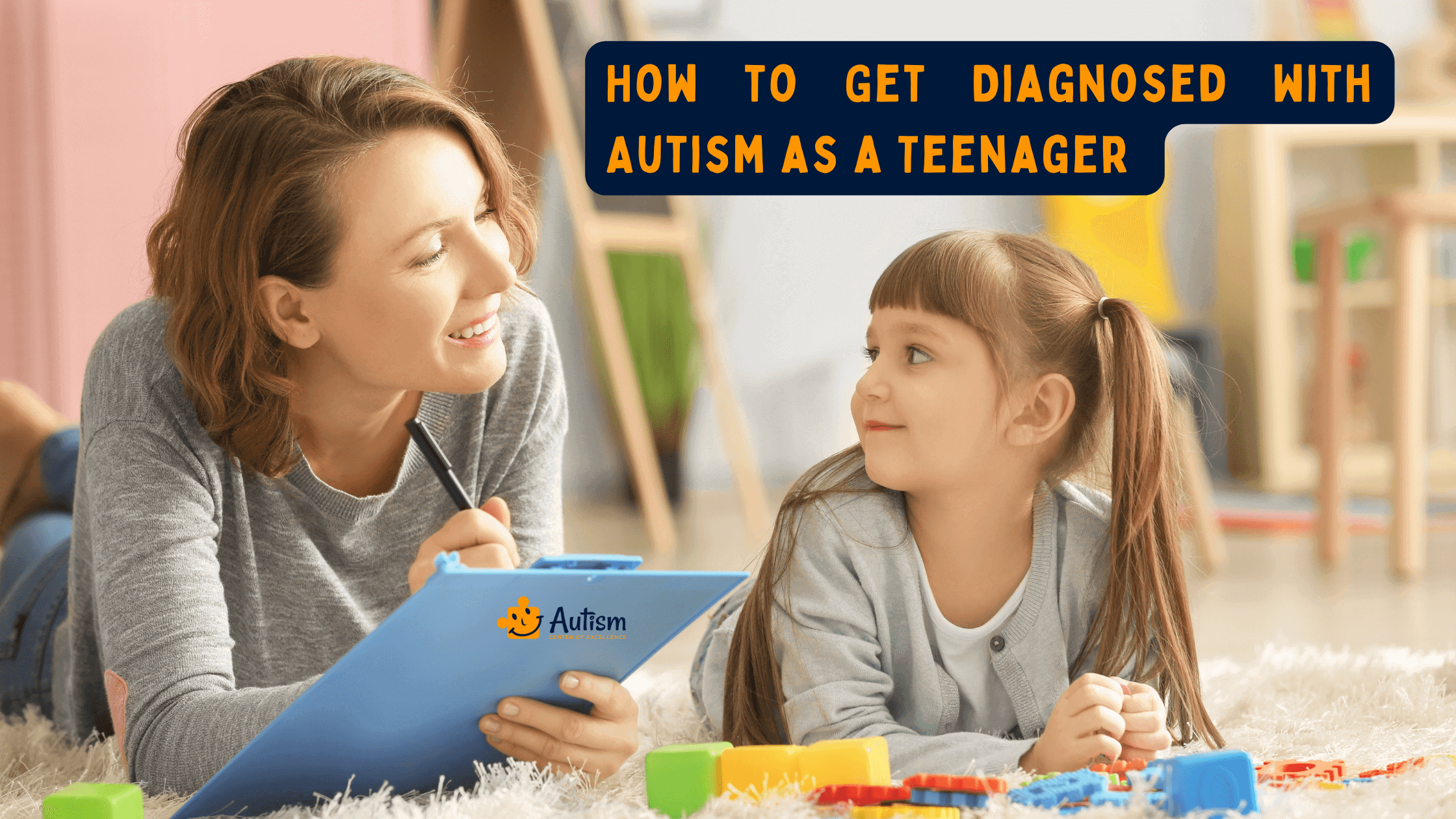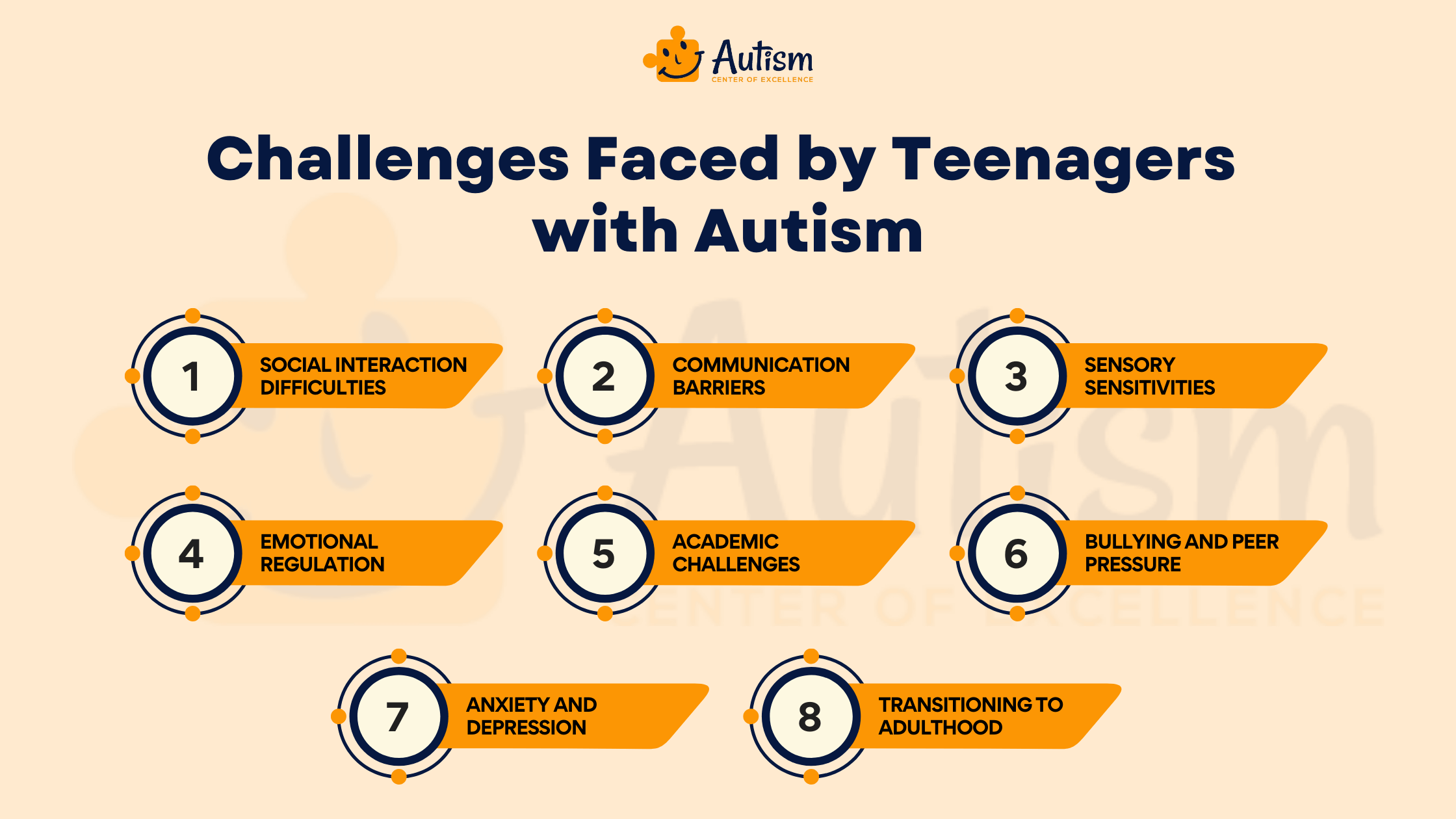The teenage years are a period of change, discovery, and a search for freedom and identity. Autism in teenagers means that this journey comes with its own set of challenges and possibilities. Therefore, it becomes essential to provide support and understanding as they undergo changes in their social life, academic requirements, and emotions.
In this blog, the challenges that teenagers with autism encounter during adolescence will be discussed in detail, and evidence-based recommendations for parents, caregivers, and educators will be presented. From social skills and sensory concerns to independence and technology, these tips are designed to help you navigate this critical period in your child’s life. From a parent looking for advice to an educator wanting to make a change, this blog provides essential information for supporting autistic teenagers.
Understanding Teenage Autism
Autism Spectrum Disorder (ASD) is a developmental disorder characterized by difficulties in social interaction, communication, and behavior. Autism does not only have its difficulties but also its advantages when one is growing up with it. Another major problem that a teenager with autism may experience is the ability to form relationships. Appearing to have a problem in interpreting non-verbal communication like body language may hinder one from effectively engaging in conversations as well as making friends.
Nevertheless, most autistic teenagers are knowledgeable and have a different perception of the world. They may perform well in school or display special gifts in music or art. ABA therapy can assist them in learning the skills needed to engage in appropriate social interactions with their peers. Therefore, autism is not something that must be a barrier, instead, it can be the opposite; a teenager with autism can have a joyful and normal teenage life.

How to Get Diagnosed with Autism as a Teenager
It can be quite difficult to diagnose autism when a child begins the teenage years, but it is very important if the child is to receive proper help. Education is the key that unlocks the acceptance of services that would greatly improve quality of life, should a diagnosis be made early enough. It is crucial to know how to go through all the procedures to get the appropriate diagnosis for yourself if you are a teenager with autism, or for your child if you are a parent.
✅ Initial Concerns:
If you find any indicators of autism or are worried about behavior, social interactions, and or communication concerns, the first step is to talk to an adult, preferably a family member or school guidance counselor.
✅ Consult a Primary Care Physician:
Consult with your family doctor or your child’s pediatrician for a discussion of the matter. The primary care physicians can evaluate your condition and recommend you seek a specialist.
✅ Referral to Specialists:
You will normally be referred to a developmental pediatrician, a psychologist, or a psychiatrist who has expertise in diagnosing the child with autism.
✅ Comprehensive Evaluation:
The specialist shall then perform an assessment exercise that may include;
- Developmental History: Evaluating experiential learning, developmental achievements, and academic background.
- Behavioral Observations: Direct observations and assessment protocols employing standard criteria in judging social, communication, and behavioral profiles.
- Interviews: Interviewing parents, teachers, and other carers to collate more information about behaviors in various contexts.
- Questionnaires and Tests: Utilizing tools such as; the Autism Diagnostic Observation Schedule (ADOS) or the Autism Diagnostic Interview-Revised (ADI-R).
✅ Diagnosis:
After the assessment, the specialist will then consider whether the child meets the requirements for an Autism Spectrum Disorder (ASD) diagnosis. This will include details of the support to be offered and the interventions that they carry out.
✅ Follow-Up Support:
Consult with healthcare practitioners, school personnel, and other therapists to come up with a specific plan that fits the needs of a child and possible achievable aims.
It is important for any teenager with such a condition to seek professional help as early diagnosis and treatment can enhance the results drastically. This leads to the proper care and implementation of necessary means and resources for autistic teenagers.
┃Suggested – Early Signs of Autism

Challenges Faced by Teenagers with Autism
The teenage period can be quite difficult, and for teenagers with autism, it becomes even harder. But as all forms of development and change suggest, this period too has its own challenges. Here are some of the most common challenges faced by teenagers with Autism.
1️⃣ Social Interaction Difficulties:
Learning social skills is especially challenging for autistic teenagers, professionals often come across individuals with such a disability. Some of the problems include difficulties in perceiving body language, interpreting facial expressions, and recognizing vocal tone as well as difficulty in comprehending other people and interacting with them.
2️⃣ Communication Barriers:
Another challenge that can be associated with teenagers with autism is communication impairment. What can be said is that all forms of communication, whether verbal or non-verbal, can turn into a little difficult sometimes, which in turn can create misunderstandings and frustrations.
3️⃣ Sensory Sensitivities:
Autistic teens are known to display excessive sensitivity to stimuli such as sound, touch, taste, smell, and sight. Teenagers may be triggered to cry by certain sounds, lights, certain types of touch, or even smells, and may affect their ability to perform routine practices or attend social functions.
┃Suggested – Managing Sensory Sensitivities in Autism
4️⃣ Emotional Regulation:
Emotional regulation is a significant issue that adolescents face; hence managing emotions during the teenage period may be an uphill task. Due to this, adolescents with ASD may have excessively sensitive feelings and not be able to self-calm or control their emotions and thus can easily feel stressed or anxious.
5️⃣ Academic Challenges:
The academic environment is not all that easy since students transit from one level to another, the academic workload increases. That’s why autistic teenagers need special consideration in order to excel academically.
6️⃣ Bullying and Peer Pressure:
Sadly, teenager with autism are prone to bullying and pressure from friends mainly because of social and communication impairments. This is why it is very important to attend and stop such circumstances, as bullying can negatively affect their mental and emotional state.
7️⃣ Anxiety and Depression:
The challenges of teenage life can cause state of anxiety and depression to autistic teenagers. These mental health challenges can be made worse due to the social and sensory issues that they have to deal with.
8️⃣ Transitioning to Adulthood:
Transition to adulthood is especially important for teens with autism as they must decide on their further education, working environment, and housing.
It is, therefore, essential to grasp these hurdles to promote the well-being of teenagers with autism during their key years. Specifically, the following approaches assert that parents, caregivers, and educators can enable autistic teenagers to understand social intercourse, communication difficulties, sensory issues, emotional dysregulation, and academic stressors more efficiently. It is therefore possible for these teenagers to as well have a healthy and fulfilling teenage experience.
Strategies for Navigating the Teenage Years with Autism
The teenage period is one of the most difficult ones for teenagers with autism but they are capable of handling it with appropriate guidance and assistance. Here are several strategies that may assist autistic teenagers in their disability self-management during adolescence.
Early Intervention:
Supportive measures should be put in place right from when a child is young with an objective of developing skills that will help him or her go through the teenage stage.
Social Skills Training:
Engage in tutored training activities that focus on social skills in a controlled environment.
Role-Playing:
Role-play various social situations at home to help make them seem more ordinary and thus less stressful.
Visual Supports:
Use objects such as charts, diagrams, and pictures to support and explain ideas and plans.
Use Sensory Tools:
Some of them include noise-canceling headphones, fidget devices, and weighted blankets that can tame sensory overload.
Teach Emotion Identification:
Facilitate the process of identifying and labeling feelings that teenagers with autism might have, so that they can build an accurate awareness of what they think and feel.
Calming Techniques:
Teach strategies, for instance, deep inhalation and exhalations, relaxation, use of weighted clothing, and self-awareness techniques that can be used in controlling emotions.
Individualized Education Programs (IEPs):
Collaborate with educators on individualized programs to meet the individual student’s educational requirement.
Anti-Bullying Programs:
Support and engage in anti-bullying programs supported in the school to ensure that all the students feel safe and appreciated.
Life Skills Training:
Support and engage in anti-bullying programs supported in the school to ensure that all the students feel safe and appreciated.
Career Counseling and Planning:
To guide them more on educational and vocational training so that they may make the right choices in their future.
Transition Plans:
Ensure high school to college, employment, and living strategies are clearly described to guide students from one stage to another.
Connection with Support Groups:
Parents and teenagers with autism should join support groups because they will meet other parents with kids with the same condition and get resources on how to handle that condition.
Professional Support:
Introduce specific interventions to cater to the identified needs of autism through working with therapists, counselors, and other experts in this field.
Role of Technology:
Incorporate apps and software that improve communication, organization, and learning for the participant. Ideally, useful gear includes speech-generating devices, educational applications, and scheduling software.
┃Suggested – How Technology Support Child’s Autism Learning Journey
Supporting teenagers with autism involves managing social communication, sensory, emotional, academic, and future planning difficulties. Thus, parents, caregivers, and educators can use these strategies and guarantee proper care for teenagers with autism during this critical period of life.
Join Our Weekly Newsletters!
Subscribe now to stay updated with our latest email updates.

Tips For Parents Of Teenagers With Autism
Parenting a teenage child with autism comes with its rewards as well as its difficulties. Here are some practical tips for parents to help their child navigate the teenage years successfully:
Prioritize Communication:
Be concise and specific in the language you use and incorporate diagrams where possible. Communicate with each other about their emotions and incidents in a very transparent manner.
Foster Social Skills:
Attend social skills training and engage in role-play at home to enhance the social relations of the child.
Create Sensory-Friendly Environments:
Modify your home so it provides accommodation for your child’s senses, and collaborate with schools so they do the same.
Address Bullying and Peer Pressure:
Talk to your child about his or her experiences with peers and support anti-bullying initiatives at school.
Promote Independence:
Enrich your child with necessary life experiences including cooking, managing personal finances, washing, and organizing his or her time in order to live as an independent adult.
Build a Support Network:
Join parents or teenagers with autism support groups to discuss experiences, learn about available resources, or seek recommendations from other parents or teenagers with autism.
Encourage Extracurricular Activities:
Search for organizations or groups your child can join so they can learn how to make new friends outside class.
Regular Physical Activity:
Promote physical activity to overcome stress-related conditions and enhance overall well-being. Exercise also entails social interaction since most physical activities are done with other people.
Professional Support:
Communicate with the other professionals that your child has autism and work closely with therapists and counselors.
Be Patient and Understanding:
Understand that your child may come across and respond to situations in a completely different manner. They need to be supported and targeted with patience, understanding, and constant backing for them to do well.
In this way, the parents can positively contribute towards ensuring their teenagers with autism successfully manage the challenges of teenagehood and acquire the appropriate skills that will enable them to lead meaningful lives in the future.
Gift Ideas for a Teenager with Autism
When buying the gift for a teenager with autism, you can make the whole process relevant and engaging, for want of a better word, considering his/her interest, aspiration and compelling requirements. Here are some ideas that cater to various sensory, educational, and recreational interests:
➡️ Sensory Toys:
Objects such as weighted blankets, focalizing spinners, stress toys, and chewable accessories assists to address the issue of sensitivity to touch.
➡️ Technology Gadgets:
Tablet or other gadgets connected to the Internet, noise canceling headphones, smart watches can be entertaining and educational/improving communication.
➡️ Educational Games and Puzzles:
Educational toys, which include games, building sets (Legos), puzzles, boost problem solving abilities while at the same time giving enjoyable playing.
➡️ Art Supplies:
Coloring pencils, metal stamping sets, calligraphy kits, and crayons, good quality art pens, sketchbooks, art painting sets or clay sets are very effective in developing creativity and may also be effective tools in calming a child down.
➡️ Books and Audiobooks:
This could include books related to subjects they enjoy, graphic novels for interest, or even audiobooks for a more experience based learning.
➡️ Hobby-Related Gifts:
If they have some kind of a passion like music, science or sports, gifts that are related to the passion like music instruments, science kits or sports related equipments will always make a perfect gift.
➡️ Board Games and Card Games:
Choose games that the children are familiar with or can easily learn and which encourage social interaction, including ‘Uno’, ‘Connect Four’ or games like Monopoly or Risk where children can work together in one team against an adult/child team.
➡️ Comfort Items:
Soft gentle clothes, warm blankets, and soft toys can have calming effects and help the child feel protected.
➡️ Subscription Boxes:
Gift subscription boxes that are sent monthly can be planned according to a child’s interests to provide continuous and fun items to look forward to such as STEM kits, art supplies or sensory toys.
➡️ Experience-Based Gifts:
A movie outing, tickets to a favorite museum or an amusement park or membership at a club or an activity center would be points to consider as creating special memories and social interaction too.
Selecting the right gift which suits their interest and also has features that can meet the different sensory needs, will ultimately help the child be happy and productive.
Frequently Asked Questions & Answer
Can Teenagers With Autism Live on Their Own?
Yes, many teenagers with autism can live independently with the right support. This often includes life skills training, vocational education, and access to supportive services tailored to their needs.
How to Talk to an Autistic Teenager?
Use clear, direct language and avoid idioms or ambiguous expressions. Be patient, listen actively, and provide visual aids if necessary to enhance understanding.
What is the Hardest Part of Raising an Autistic Teenager?
One of the hardest parts is managing the social challenges they face, including difficulties in making friends and dealing with bullying. Balancing their need for independence with ongoing support can also be challenging.
How to Calm an Autistic Teenager?
Introduce calming techniques such as deep breathing exercises, mindfulness, sensory tools (like weighted blankets), and create a sensory-friendly environment to help them manage stress and anxiety.
Conclusion
Navigating the teenage years with autism requires understanding, patience, and tailored support. By fostering social skills, managing sensory sensitivities, leveraging technology, and promoting independence, parents and caregivers can help autistic teenagers thrive. Early intervention, clear communication, and a strong support network are essential in guiding them through adolescence. With these strategies, we can empower teenagers with autism to confidently face the challenges of their teenage years and build a promising future. Autism Center of Excellence has a significant responsibility of offering research, advocacy, and support programs that can suit each individual. AutismCOE offers ABA Therapy, Autism Early Intervention Program, Autism School Readiness Program, Speech Therapy, and Occupational Therapy services for children aged 2 – 14 years in-home as well as in center-based environments.
Please Note: The content of this blog is for informational purposes only and should not be considered a substitute for professional medical advice, diagnosis, or treatment. Consult a qualified health care professional for personalized guidance tailored to your specific situation.

Bhavika Bhasin
Bhavika Bhasin is the Research and Marketing officer at AutismCOE. She works with children and adults with ASD. Her clinical research includes evaluating various available autism screening and diagnosis methods and their efficacy. She is currently developing a novel screening exam that is indicated to be more accurate than the existing available exams. She is also writes articles papers for various publications.


